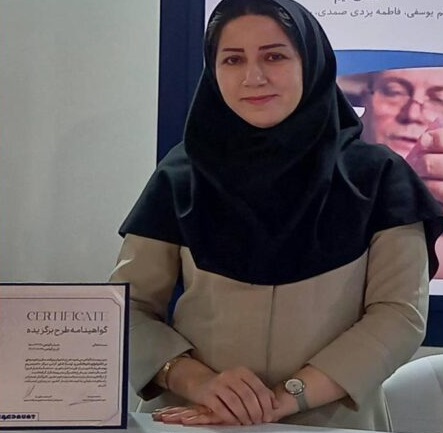Nanotechnology Research Group
The purpose of establishing the group is to develop knowledge and nanotechnology in various fields of medical sciences, including the diagnosis and treatment of chronic and hard to treat diseases.
Nanotechnology elicits new properties or improves the efficiency of materials, thereby creates new applications or promotes the properties and application of materials.
From a technical point of view, the treatment and prevention of diseases is one of the good capabilities of nanotechnology, which is fulfilled by using engineered nanostructures and nanoparticles to build, control, monitor and repair the body's biological system on a molecular scale.
According to the experiences of researchers of ARI in the field of recombinant technology, purification and production of specific antibodies and immunochemistry and synthesis of nanostructures with new properties used in biological and medical research were assigned as the ultimate goal of the Research Group.
The focus of the Research Group is on the design, study, and production of polymer nanostructures for the diagnosis and treatment of hard to treat diseases such as chronic wounds, the design of new cancer diagnostic and treatment systems, and the design of a controlled drug delivery system and assessment of its reactivity at molecular levels.
At present, the main field of activities of the Research Group is restricted to the following:
- Nanotechnology and biotechnology in designing wound dressings
- Nanosystems in cancer diagnosis and treatment
- Nanoparticles, small molecules, and antibodies against small molecules for lab use
The achievements and activities of the Research Group, established by the diligence of faculty members, are as follows:
- Preparation of wound dressings by modern methods using natural polymers, nanoparticles, and antibacterial compounds
- Binding of magnetic nanoparticles to monoclonal antibodies and peptides, optimization and application in breast cancer diagnosis
- Investigation on and optimization of metal-ion affinity chromatography of histidine-containing proteins using magnetic particles
- Extraction and purification of magnetic nanoparticles from magnetotactic bacteria (MTB)
- Construction and quality evaluation of magnetic-activated cell sorting (MACS) columns
- Synthesis, protection, and functionalization of magnetic nanoparticles
- Synthesis of titanium dioxide nanoparticles doped with metals to apply its antibacterial effect in antibiotic-resistant cases
- Stabilization of enzymes on solid substrates and functionalized nanoparticles
- Use of nano-biocatalysts as green catalysts in chemical reactions
- Production of biofuels (Biodiesel) by lipase enzymes stabilized on silica nanoparticles
- Removal of environmental pollutants by nanocatalysts
- Design of drug delivery nanosystems based on antibody-drug conjugates (ADCs)
- Synthesis of single-layer graphene oxide nanoparticles
- Synthesis of nanoparticles based on plant extract acting as reducing agents and investigation of their antimicrobial properties
- Synthesis of zinc dioxide nanoparticles and studying their antibacterial effect
The ongoing projects of the Research Group:
- Designing and manufacturing Transforming Powder Dressing (TPD) using Nanoflex Technology.
- Study and identification of wound dressing formulations based on alginate and biodegradable biopolymer compounds
- In vivo studies of chitosan-based nanoscaffolds as wound healing dressings
- Establishment of an ELISA method for the detection of SN38 in biological fluids, application in the pharmacokinetic studies of irinotecan and antibody-drug conjugates (ADCs) containing the cytotoxic charge of SN38
- Preparation of magnetic nanoparticles and modification of their surface with organic compounds in order to remove heavy metals from aqueous wastes
- Preparation of functionalized nanocarriers based on mesoporous silica nanoparticles with the ability of targeted and efficient transfer of nucleic acid to breast cancer cells
- Synthesis of new organic compounds based on proto- cachuic acid and caffeic acid esterification and oxidation of their catechol fraction by a new catalyst
Faculty members of the Research Group:
- Dr. Maryam Yousefi (Head of the Research Group)
- Dr. Mohammadreza Nejadmoghaddam
- Dr. Arash Minaei Tehrani
-
Dr. Ramin Ghahremanzadeh
-
Dr. Alireza Farasat

Dr. Maryam YousefiHead of the Research Group
















